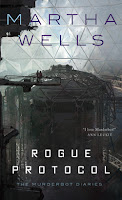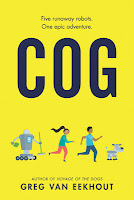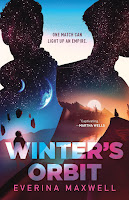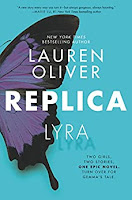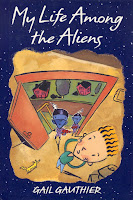I usually find the
Michael L. Printz and
Alex Awards the most interesting of the annual ALA book awards. The Printz deals specifically with YA and the Alex is a list of ten adult books with special interest for YA readers. It's not that I'm a fan of YA over books for younger readers. But I've found these older reader awards to be less predictable than those for the younger kids. The books selected are usually less instructive. There's a lot less of the small town children-mature-before-their time thing going on.
This year I went looking for an Alex book to read, for one reason and another. I will admit, Winter's Orbit by Everina Maxwell was the only one of this year's winners I could find in my library's e-book service. I had to put a hold on it, and by the time it arrived, I couldn't remember what it was about. The whole made-up-empires-on-made-up-planets-thing I noticed at this point didn't fill me with enthusiasm.
However, I most definitely understand how this book made a list of adult books with interest for YA readers, because YA Gail would have loved this thing. Adult Gail enjoyed it, too.
Like A Historical Romance In Space
As a teenager, I was a big fan of historical romance. I continued reading it through college, primarily during exam weeks. Clearly some kind of relaxation/calming strategy. Winter's Orbit follows a classic historical romance pattern. A couple, often of unequal status, end up married, but because of a series of misunderstandings they don't understand they love each other/are meant to be together/are only moments from happiness.
This is not the Pride and Prejudice model of hate-at-first-sight and come-around-to-love-later seen in a great many contemporary romantic comedies. The situation I'm talking about involves characters who usually don't bear each other any ill will and have good intentions, but misunderstandings keep them apart emotionally.
At her website author Maxwell says that as a teenager she read science fiction and fantasy, "with her family’s Georgette Heyer collection always a reliable friend when the library books ran out." Heyer's historical romances were the reliable friend for many teenagers, and her influence is sprinkled all over Maxwell's novel.
In the world of Winter's Orbit, Prince Kiem and Count Jainan enter an arranged marriage to seal an agreement between their planets. Prince Kiem is a reformed playboy (a variation on the reformed reprobate often seen in romances), who now has a pseudo career as a Prince Harry-type, making appearances as a patron to various organizations. A charming guy, but not, at first glance, an intellectual heavyweight. Count Jainan is a very recent widower, a diplomat who had been half of another arranged marriage in support of his home world. A very serious guy who is carrying around a whole lot of anxiety.
While dealing with all the confusion regarding their mutual attraction, they end up up-to-their necks in a political mystery.
World Building Around Gender
Science fiction, like historical fiction, has a great deal to do with world building, and Winter's Orbit's is extremely interesting in relation to gender. There's not much in the way of gender issues in this empire. Evidently males and females may dress so similarly that they express their gender, should they want to, by wearing certain types of jewelry. Whether male, female, or nonbinary, the royal at the top of the heap is referred to as "emperor." There are no princesses, everyone carrying that status is a prince. There are no gay marriages or lesbian marriages or heterosexual marriages. No modifiers, only marriages. Spouses usually refer to themselves as "partners" rather than "husbands" or "wives," which gives the couples a definite level of equality. A male character is referred to as beautiful, without that word having the feminine connotations many readers would expect. Anyone could be beautiful here.There are no references to a female military person or academic having had to fight her way up because of sexism. Presumably no one in the Winter's Orbit world would know what that is.
A Blast From The Past
I think a big part of the reason I enjoyed this book so much is that it took me back to a time when I read things similar to this regularly, a time when I just read to read, could stay up late doing it, and didn't have responsibilities beyond final exams. Compared to what came later in life, final exams were nothing at all.
Time to return Winter's Orbit. There are three people waiting for it. I'm not at all surprised.
